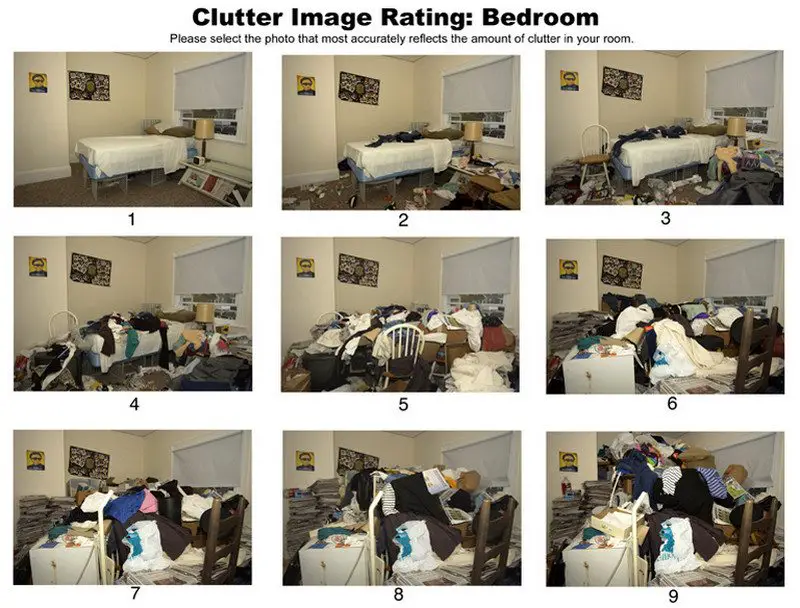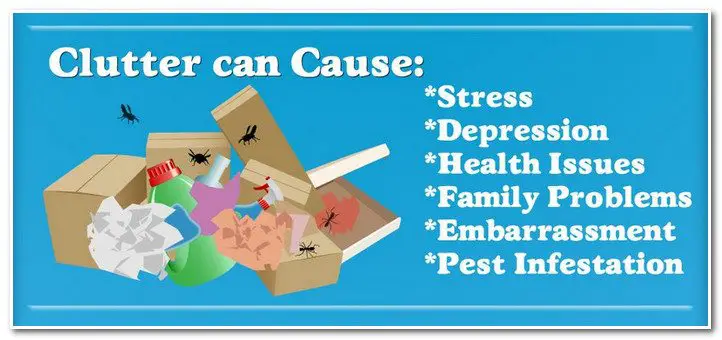There are some of us who like to travel lightly. There are others who have difficulty leaving anything behind. The more you carry, the harder the journey!
I recall a conversation with a woman who’s husband had recently retired after 25 years of service in the army. She lamented that the worst thing about retirement was that they seemed to be accumulating a heap of things they really didn’t need. She went on to explain that army life is so mobile, with frequent new postings, that you don’t get a chance to hoard. I had never thought about it but it made enormous sense.

Interestingly, you and I will have very different definitions of what constitutes clutter. When presented with the above choices, individual responses vary markedly suggesting that clutter and hoarding are very much in “the eyes of beholder”. True hoarders fall under a strict medical definition and make up between 2% and 5% of the population.
Hoarding is a psychological disorder distinguished by the compulsive accumulation of possessions through compulsive shopping and collecting, and an inability to discard or organize the growing piles of objects.
What cannot be disputed is that clutter creates stress and can lead directly to household accidents and family illness. For example, clutter is going to mean that things like car keys ‘get lost’ frequently. Trying to find keys when you have to get to work, pick up the kids or get to an appointment isn’t likely to put you in a meditative state! Another example is that clutter gives vermin like cockroaches, fleas, rats and mice and even snakes plenty of scope to hide and breed. Yes, snakes love clutter because rats and mice – a ready food source, are there!
Another major risk that even moderate hoarders face is a house fire. Fires can start in any home but clutter adds to the risk in two ways. Firstly, there is simply a greater risk of combustible material coming in contact with a heat source. Then there is the simple reality that clutter provides ready and plentiful fuel if that fire does start. House fire fatalities are often associated with household clutter.
How to tell if you are a hoarder:
I’ve already said that we all see the world differently, but according to Smith College psychology professor, Randy Frost, “People who hoard save everything, and it’s the good stuff as well as the crummy stuff. Hoarders are very interested in the physical world and see it in a different and more complex way than the rest of us do. Most of us look at a bottle cap and see just that. Hoarders look at it and see the shape, the colour, the unusual details that the rest of us overlook. By noticing this, it gets valued and offers a whole host of potential uses. But it’s potential that they never follow up on. It’s creativity run amok.”
Young children often exhibit these same characteristics. The world is full of fascinating objects that they want to keep – stones and feathers and insect skeletons that simply ‘must’ find a place amongst their treasures. But most of those children grow out of their collection – possibly replacing it again and again as they grow. That’s healthy development. It’s when they refuse to part with the old and simply bring in the new, that a problem may be present. That problem, if it persists will probably manifest as an OCD disorder.
Hoarding verses clutter:
You probably fall within the 95% of the population that do not fit the medical definition. But that does not clear you of the charge of “clutter”. Look around you. Do you have stuff sitting on chairs or sofas where bottoms are supposed to be? Maybe you have stuff on the floor ‘waiting to get put away’. If it’s got dust on it, it ain’t goin’ nowhere in a hurry unless you change your perception! Which brings us to the crux of the matter:
How to declutter:
The first step is to detach your emotions from your physical possessions. Love your family, pets and friends but, seriously now, can you really ‘love’ a physical possession? Get a trusted friend to help you. You may ‘love’ that dress you looked great in 10 years ago, but let’s face it honey, those two kids and 10 pounds aren’t going to get you back into that dress in a hurry. No John, wide lapel suits aren’t about to come into fashion again next season. And if they do, camel brown corduroy will not be the colour or fabric of choice! The vase that Aunt Maud gave you as a wedding gift? You didn’t like it then… what makes you think you’re going to like it in the future? That bed linen you bought at that sale? Sure it was cheap. That’s why it’s been in the cupboard for 10 years!
Next, create piles. The first is the ‘I’d rather die than surrender this‘ pile. Don’t cheat with this pile or nothing will change. Get your friend to wipe your tears but console yourself with the thought that, if you really, really make a mistake, there’s another sale just around the corner.
The second pile is the ‘yard sale‘ pile. Look at your clutter as cash. You know the deal, one person’s trash etcetera. Don’t bother holding out for top dollar. That’s just another excuse. People who come to yard sales want bargains… just like you do! At the end of the day, you’ll be surprised just how much cash you’ve reclaimed. What doesn’t sell either goes to charity or in the third pile…
The rubbish pile. If you have a lot of clutter, consider getting a skip bin for a week (and resist the temptation to pull anything back out of it). Sure it might hurt for a while but trust your friend. If he or she says it’s rubbish, it’s rubbish!
Here’s a neat infographic I found that might help you get started:
What say you, dear friend? Can you look around and see a clutter free home? Hold on now! Go back to that top chart. The first and only the first image (#1) is a truly clutter free bedroom.
Some of us own possessions. For some, it’s the opposite… their possessions own them. Could your life benefit from a declutter? As always, your comments and opinions are highly appreciated.








